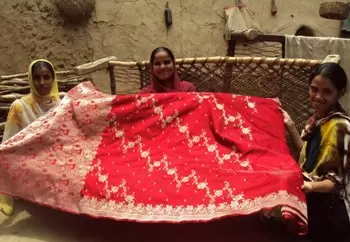Weavers from across India expect government to bail them out of distress
09-March-2012
Vol 3 | Issue 10
Ali Husain Ansari, a weaver of embroidered Mughal textiles and owner of Abdul Ghani Silk in Varanasi town of northern India, says he has not benefited from the government's financial package for weavers announced in December 2011.
"All the money sanctioned by the government has gone to cooperative societies. The poor weaver still makes less than Rs.200 ($4) a day and does not have enough assets for loan guarantee," says Ali.
 |
|
The government should announce packages to bail out the struggling weavers (Photo: IANS)
|
Traditional Indian handloom textiles may have made international fashion statements, but their estimated over 5 million creators in villages across the country are battling shrinking resources, under-exposure and loss of livelihood.
The commerce and industry ministry had announced a Rs.2,350 crore package for weavers to bail weavers out of distress. But the weavers say government packages to bail them out have passed them by.
Husain said hundreds of Mughal textile weavers in Varanasi and in the villages around it have switched to pulling rickshaws to fend for themselves.
He and thousands of his fellow weavers in Varanasi depend on "resham" threads from "Korea" and yellow "tussar" from China. "Their prices fluctuate between Rs.1,680 and Rs.4,500 (per bale). A loan of Rs.25,000 to 50,000 is not enough," he said.
The muga weavers of Assam are fighting against farm pesticides that are killing muga silk worms in their habitats in Upper Assam.
Muga, one of the costliest and rarest varieties of silk, is known as "the golden fibre of Assam".
"The volume of fibre extracted from silkworms has decreased over the years with muga worms dying of chemcials that farmers in Upper Assam spray in their fields," says weaver and crafts actvist Kusum Lashkar, who manages the NGO Shanti Sadhana Ashram in Guwahati.
The effect of the pesticides spreads far and wide and destroys silk farms. "The constrained production has led to an increase in prices of muga silk by almost 50 percent," Lashkar claimed. The muga weavers of Assam have been facing a demand-supply gap over the last few years, the weaver said.
Such tales of neglect, poverty and poor implementation of government projects at the grassroots fought for attention with a colourful spread of handloom products at "Kargha Yagya" at the sprawling Gandhi Smriti Feb 23.
The textile showcase was in memory of Kasturba Gandhi, the woman who spun the charkha alongside her husband Mahatma Gandhi.
An unknown community of sheep wool weavers in Jharkhand - the Behriyar-Gareriya nomads from the Gaya district in Bihar - has almost given up its traditional craft of blanket weaving for lack of funds.
"We weave blankets from sheep wool collected from our herds of sheep. But the state government (the state handloom and handicraft corporation Jharcraft) has turned its face away from us and we cannot compete with the blankets being sold in the markets.
“Our blankets cost Rs.300 each in the market while each blanket costs Rs.350 to weave. We are forced to sell our products in villages because of limited access to urban markets," said weaver Kundan Bhagat.
The community of 75 wool weavers' families live in two villages - Mahwawdavan and Barawad in Madhupur block. Bhagat, whose family owns a herd of 500 sheep, says "the near-death of the blanket weaving tradition has killed the barter system of economy that helped the villagers sustain".
Ajay Singh, a weaver from Bhagalapur in Bihar, known as India's silk city, said "the government should work directly with communities of weavers in villages for holistic welfare of the communities".
He demanded a "residential school for the childern of weavers where they would learn their native tongue, the national language and an international language to compete in the global market". - IANS














